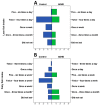Omega-3 Long-Chain Polyunsaturated Fatty Acids Intake in Children with Attention Deficit and Hyperactivity Disorder
- PMID: 31126106
- PMCID: PMC6562756
- DOI: 10.3390/brainsci9050120
Omega-3 Long-Chain Polyunsaturated Fatty Acids Intake in Children with Attention Deficit and Hyperactivity Disorder
Abstract
Omega-3 long-chain polyunsaturated fatty acids (LC-PUFA) play a central role in neuronal growth and in the development of the human brain, and a deficiency of these substances has been reported in children with attention deficit hyperactive disorder (ADHD). In this regard, supplementation with omega-3 polyunsaturated fatty acids is used as adjuvant therapy in ADHD. Seafood, particularly fish, and some types of nuts are the main dietary sources of such fatty acids in the Spanish diet. In order to assess the effect of the intake of common foods containing high amounts of omega-3 polyunsaturated fatty acids, a food frequency questionnaire was administered to parents of children with ADHD (N = 48) and to parents of normally developing children (control group) (N = 87), and the intake of dietary omega-3 LC-PUFA, such as eicosapentaenoic acid (EPA) and docosahexaenoic acid (DHA), was estimated. Children with ADHD consumed fatty fish, lean fish, mollusks, crustaceans, and chicken eggs significantly less often (p < 0.05) than children in the control group. The estimated daily omega-3 LC-PUFA intake (EPA + DHA) was significantly below that recommended by the public health agencies in both groups, and was significantly lower in children with ADHD (p < 0.05, Cohen's d = 0.45) compared to normally developing children. Dietary intervention to increase the consumption of fish and seafood is strongly advised and it is especially warranted in children with ADHD, since it could contribute to improve the symptoms of ADHD.
Keywords: ADHD; children; diet-deficient; fish intake; nutrients; omega-3 fatty acids.
Conflict of interest statement
The authors declare no conflict of interest.
Figures
References
-
- Sarris J., Logan A.C., Akbaraly T.N., Amminger G.P., Balanzá-Martínez V., Freeman M.P., Hibbeln J., Matsuoka Y., Mischoulon D., Mizoue T., et al. International Society for Nutritional Psychiatry Research. Nutritional medicine as mainstream in psychiatry. Lancet Psychiatry. 2015;2:271–274. doi: 10.1016/S2215-0366(14)00051-0. - DOI - PubMed
LinkOut - more resources
Full Text Sources
Research Materials



